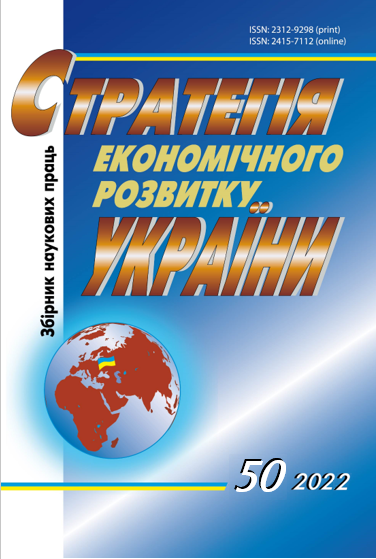ТУРИСТИЧНИЙ КЛАСТЕР – ІНСТРУМЕНТ РЕГІОНАЛЬНОГО РОЗВИТКУ ТА ЕКОНОМІЧНОГО ЗРОСТАННЯ
DOI:
https://doi.org/10.33111/sedu.2022.50.134.149Ключові слова:
туристичні кластери, регіональний розвиток, економічне зростання, туристична галузь, розвиток кластеру, туристичний продуктАнотація
В статті авторами розглянуто роль туристичних кластерів, як інструменту регіонального розвитку та економічного зростання. Обгрунтовано розвиток туризму в регіонах та його сприяння збільшенню ВВП, зайнятості, притоку іноземної валюти та розвитку регіонів, інфраструктури, соціальній та економічній інтеграції. Розкрито роль кластерного підходу не тільки у виробничій сфері, а й у туристичній галузі.
Авторами поставлено і обгрунтовано цілий ряд завдань: визначення основних засад та концептуальних підходів туристичних кластерів, розглянути особливості формування і розвитку туристичних кластерів, розробити механізм кластерного управління розвитком внутрішнього ринку туристичних послуг в Україні. Запропоновано визначення поняття "туристичний кластер", розглянуто блок формування та розвитку туристичних кластерів, доведено, що важливим учасником кластеру має бути споживчий туристичний продукт.
Посилання
Porter, M. E. “Clusters and the New Economіcs of Competіtіon”. Harvard Busіness Revіew, Nov.-Dec. (2002): 77-90.
Rocha, H. “Entrepreneurship and Development: the Role of Clusters”. Small Business Economics, 23(2004): 363-400.
Klaster turyzmu: Lviviany pochynaiut i peremahaiut abo chomu varto vtiliuvaty stratehiiu vzhe sohodni. [Tourism cluster: Lviv residents start and win or why it is worth implementing the strategy today.] Instytut mista. Lviv, 2010. [in Ukrainian].
Martin, R., and Sunley, P. “Deconstructing Clusters: Chaotic Concept or Policy Panacea?” Journal of Economic Geographic, 3 (2003): 5-35.
Swann, G., and Prevezer, M. “A Comparison of Dynamics of Industrial Clustering in Computing and Biotechnology”. Research Policy, 25 (1996): 1139-1157.
Bergamn, E., and Feser, E. Industrial and Regional Clusters: Concepts and Comparative Applications. University of West Virginia. (1999). http://www.rri.wvu.edu/WebBook/Bergman-Feser/contents.htm. (accessed 26.04.2022).
Morosini, P. “Industrial Clusters, Knowledge Integration and Performance”. World Development, Vol. 32 No. 2 (2004): 305-326.
Davydenko, I. V., and Mykhailiuk, O. L. (ed). Kontseptualni pidkhody do orhanizatsii ta diialnosti turystychnykh klasteriv. [Conceptual approaches to the organization and activity of tourist clusters]. Kyiv: FOP Huliaieva V. M., 2020. [in Ukrainian].
Breda, Z. Costa, R., and Costa, C. “Do Clustering and Networks Make Small Places Beautiful? The Case of Caramulo (Portugal)”. In: L. Lazzeretti, and C. Petrillo, Tourism Local Systems and Networking. Kidlington, Oxford, UK: Elsevier, 2004.
Jackson, J., and Murphy, P. “Tourism Destinations as Clusters: Analytical Experiences From The New World”. Tourism and Hospitality Research, 4(1) (2002): 36-52.
Porter, M. “Clusters and the New Economics of Competition”. Harvard Business Review, 76(6) (1998): 77-90.
Andrusiak, N. S. “Rekreatsiino-turystychni klastery yak efektyvnyi instrument mizhrehionalnoi ta mizhnarodnoi spivpratsi”. [“Recreational and tourist clusters as an effective tool for interregional and international cooperation”]. Heohrafiia ta turyzm, vol. 28 (2014): 75-86. [in Ukrainian].
Bochan, I. O. “Intehratsiini protsesy klasteryzatsii u turyzmi: publichno-pryvatne partnerstvo”. [“Integration processes of clustering in tourism: public-private partnership”]. Visnyk Lvivskoho instytutu ekonomiky i turyzmu, no. 11 (2016): 59-65. [in Ukrainian].
Holub-Ivan, Y. (ed.) Benchmarking klastrow w Polsce – edycja 2012. Raport z badania. [PARP, Warszawa] (2012).
Kol, O. D. “Kontseptualniye osnovy formirovaniya klastera turysticheskih pred-prinimatelskih struktur po vjezdnomu turizmu v krupnom gorode”. [“Conceptual bases of formation of a cluster of tourist business structures on inbound tourism in a large city”]. Problemy sovremennoi ekonomiki, no. TsZZ (2010): 379-393. [in Russian].
Nikolaiev, Yu. O. “Turystychni klastery v Ukraini”. [“Tourist clusters in Ukraine”]. Visnyk sotsialno-ekonomichnykh doslidzhen, vol. 4 (47) (2012): 336-341. [in Ukrainian].
Osmynkyna, A. D. “Yssledovanye vozmozhnostei sozdanyia ynformatsyonno-analytycheskykh modelei dlia postroenyia y upravlenyia turystskymy klasteramy (na prymere Vladymyrskoi oblasty)”. [“Study of the possibilities of creating information and analytical models for building and managing tourist clusters (on the example of the Vladimir region)”]. II Alhorytmy, metody v systemy obrabotky dannykh, no. 14 (2009): 100-105. [in Russian].
Turyzm y rekreatsyia: fundamentalnye y prykladnye yssledovanyia. [Tourism and recreation: fundamental and applied research]. Trudy 5 mezhdunarodnoi nauch.-prakt. konf. MHU ym. M.V. Lomonosova (Moskva, 28-29 aprelia 2010 h.). SPb.: D.A.R.K., 2010: 26. [in Russian].
Tarasionok, A. Y. Neoekonomika turyzmu. [Neo-economics of tyrism]. Mynsk: Novoe znanye; YNFRA-M, 2011. [in Russian].
Capone, F. “Regional Competitiveness in Tourism local Systems”. 44 European Congress of the European Regional Science Association, Regions and Fiscal Federalism. Universidad the Porto, 2004.
Beni, М. Globalizagao do Turismo: Megatendencias do Sector e a Realidade Brasileira. Sao Paulo: Editora Aleph, 2003.
Dias, A. “Tourism as a leverage sector in the new model of economic growth”. Tourism Sustainability and Territorial Organization. Proceedings of Xllth Meeting (Faro, Portugal, July 4-10, 1999).
Cunha, S. K., and Cunha, J. C. “Tourism cluster competitiveness and sustainability proposal for a systemic model to measure the impact of tourism on local development”. BAR, No.2(2) (2005): 47-62.
Kovaleva, Yu. M. “Praktychni pryklady funktsionuvannia klasteriv u sviti”. [“Practical examples of clusters in the world”]. The mechanism of economic regulation, vol. 3(2), T. 1 (2008): 92-100. [in Ukrainian].
Radaev, V. V. Sociology of markets: to the formation of a new direction. Moscow, 2003.
Hisrich, R. D., and Peters, M. Entrepreneurship: Starting, Developing, and Managing a New Enterprise (9th ed.). McGraw-Hill Education, 2012.
Simmie, J. “Innovation and Clustering in the Globalised International Econo-my”. Urban Studies, 41(5/6) (2004): 1095-1112.
Obadac, A. “Specificities of EU cluster policies”. Journal of Enterprising Communities: People and Places in the Global Economy, 7(1) (2013): 23-35. DOI: 10.1108/17506201311315581
Chuang, L.-M., Tsai, M.-T., and Shiu, J.-J. “The impact of customer interaction on customer loyalty in Taiwan’s international tourist hotels: the mediating effect of service quality and trust”. Innovative Marketing, 8(2) (2012): 33-45. https://business-perspectives.org/journals/innovative-marketing/issue-133/the-impact-of-customer-interaction-on-customer-loyalty-intaiwan-s-international-touristhotels-the-mediating-effect-ofservice-quality-and-trust (accessed 26.04.2022).
Reve, T., and Sasson, A. “Theoretical and methodological advances in cluster research”. Competitiveness Review, 25(5) (2015): 524-539. DOI: 10.1108/CR-06-2015-0062
Fundeanu, D. D. “Innovative Regional Cluster, Model of Tourism Develop-ment”. Procedia Economics and Finance, 23 (2015): 744-749.
Kozmenko, О., and Abramitova, D. “The methodical approach to the establishment of interdependencies in the development of insurance and tourism markets”. Problems and Perspectives in Management, 13(1) (2015): 113-120. https://businesspers_pectives.org/media/zoo/applications/publishing/templates/article/assets/js/pdfjs/web/6342 (accessed 26.04.2022).


